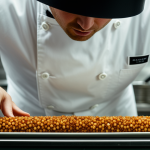Strategies for Preserving UK Culinary Heritage
Preserving UK culinary heritage is a multifaceted effort involving organisations dedicated to safeguarding traditional British cuisine. These entities focus on documentation, education, and community engagement to ensure the survival of culinary customs.
Food festivals play a crucial role in this preservation process. They celebrate regional specialties and provide opportunities for sharing authentic recipes. Museums dedicated to food history offer immersive experiences that highlight the evolution of British culinary practices, making history tangible and accessible.
Also read : How Will Upcoming Innovations Transform the Future of UK Kitchens?
Educational programmes complement these efforts by teaching younger generations about cooking techniques and the cultural significance of dishes. Community projects often focus on researching and reviving forgotten regional recipes, fostering a sense of cultural pride and continuity.
Together, these strategies form a robust framework for the preservation of UK culinary heritage. They not only maintain traditional British cuisine but also encourage innovation within those frameworks, ensuring heritage remains vibrant and relevant. Such approaches recognize that preserving culinary history requires active participation and the revival of stories and flavours unique to the UK’s diverse regions.
Also read : How is the UK kitchen industry adapting to modern challenges?
Impact of Globalization and Immigration on British Cuisine
Globalization and immigration have profoundly shaped British cuisine, introducing diverse ingredients and cooking techniques while challenging traditional culinary boundaries. Global influences have enriched UK culinary heritage, blending new flavours with age-old recipes to create unique hybrids.
Immigrant communities have played a pivotal role by integrating spices, herbs, and methods from their native cultures. For example, the popularity of curries reflects South Asian migration impacting British kitchens. Likewise, Mediterranean and Caribbean ingredients have found their way into everyday cooking, expanding the repertoire of traditional British dishes.
How does this affect the preservation of traditional British cuisine? While diversification introduces change, it also prompts efforts to protect and adapt local identity. Food preservation strategies now include recognising and valifying immigrant contributions as part of a broader heritage rather than viewing them as threats.
Thus, culinary integration in the UK is a dynamic process. It fosters inclusivity while prompting stewardship of UK culinary heritage, ensuring that evolving tastes and cultural exchanges coexist with valued traditions. This balance helps maintain the authenticity and relevance of British food in a globalising world.
Strategies for Preserving UK Culinary Heritage
Organisations devoted to UK culinary heritage play a vital role in maintaining traditional British cuisine through targeted food preservation strategies. These initiatives often begin with meticulous documentation of recipes and cooking methods passed down through generations. Accurate records ensure that authentic techniques and unique regional flavours are preserved before they risk fading away.
Food festivals serve not only as celebrations but also as platforms for sharing and educating about regional dishes. By spotlighting lesser-known recipes, festivals stimulate public interest and participation in heritage cuisine. Museums dedicated to culinary history provide educational experiences that contextualise these traditions, making the past accessible and engaging.
Community projects are instrumental in reviving forgotten regional recipes. They actively involve locals in researching and recreating dishes, fostering a shared sense of pride and identity. Educational programmes complement these efforts by teaching young people both cooking skills and the cultural significance behind classic dishes. Together, these food preservation strategies form an interconnected framework, safeguarding the richness of UK culinary heritage for future generations while keeping traditional British cuisine vibrant and relevant.
Strategies for Preserving UK Culinary Heritage
Organisations dedicated to UK culinary heritage implement vital food preservation strategies that focus on safeguarding traditional British cuisine. A primary initiative involves thorough documentation of recipes and cooking methods. This ensures that unique regional characteristics and classic techniques remain accessible for future generations, preventing loss through oral transmission alone.
Food festivals contribute significantly by promoting awareness and appreciation of diverse local dishes. These events invite communities to experience authentic flavours and heritage preparations, bridging generational gaps. Museums dedicated to culinary history provide interactive displays and contextual information, enriching public understanding of the origins and cultural importance of UK culinary heritage.
Community projects play a central role in the revival of forgotten regional recipes. Through local research and collaboration, these projects reconnect people with their food traditions, strengthening identity and pride. Education programmes amplify these efforts by teaching both practical cooking skills and the deeper cultural narratives behind dishes, embedding heritage appreciation in younger generations.
Together, these strategies create a comprehensive framework that actively preserves and revitalises traditional British cuisine, reinforcing food preservation strategies as essential tools in maintaining the UK’s rich culinary tapestry.
Strategies for Preserving UK Culinary Heritage
Key organisations dedicated to UK culinary heritage spearhead essential food preservation strategies by prioritising detailed documentation of traditional British cuisine. This involves creating comprehensive records of recipes and cooking techniques, ensuring that regional nuances are not lost over time. Such documentation acts as a reliable reference for chefs, historians, and communities aiming to retain authenticity.
Food festivals serve as interactive platforms, bringing heritage dishes to life and raising public awareness of diverse regional flavours. These events encourage engagement and celebrate local culinary identity, reinforcing community pride in UK culinary heritage. Museums complement festivals by providing educational exhibits that illustrate the historical context and evolution of British dishes, deepening visitors’ appreciation.
Community projects focusing on restoring and reviving traditional British cuisine are pivotal. They involve collective research and practical cooking sessions that bring forgotten recipes back to tables, ensuring culinary traditions are passed down. Educational programmes further embed these values by teaching younger generations the cultural significance and preparation methods of heritage foods. Altogether, these initiatives form a cohesive framework, actively preserving the richness of UK culinary heritage through sustained and diverse efforts.

